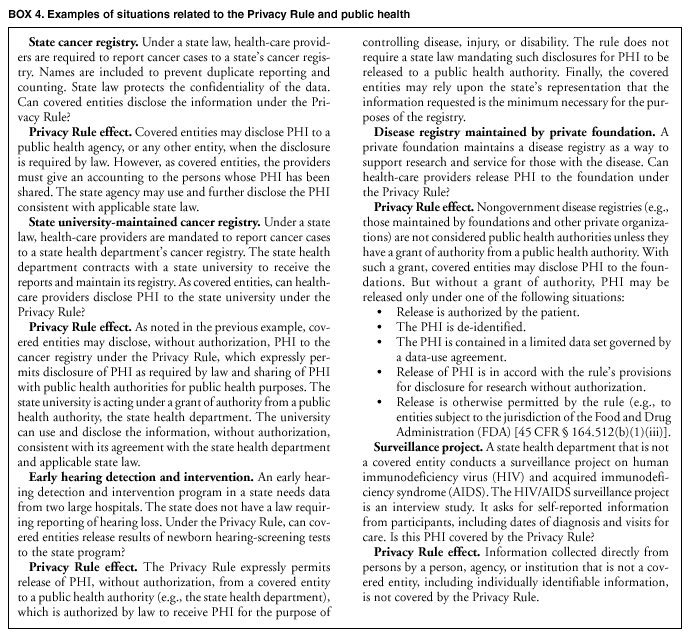
What is an Authorization to Disclose? Protected health information may also be provided to patient caregivers for example family members but only if the patient expressly agrees or impliedly consents. Certain disclosure may also be made by a health care provider without patient authorization to accomplish public health activities and other permitted uses as set forth in the Privacy Rule. The following is a list of commonly asked questions that should be directed to the Department of Health and Human Services, Office of Civil Rights at or toll free at The complaint must be in writing, describe the acts or omissions that you believe violate your privacy rights, and be filed within days of when you knew or should have known that the act or omission occurred.
The Department of Health will not retaliate against you for filing a complaint. Notice of Privacy Practices. Authorization to Disclose Confidential Information. Request for Accounting of Disclosures.
Personal Representation and the Law
Initiation of Services Department of Health. By using this site, you agree to the Privacy Policy. It's a New Day in Public Health. Get Your Flu Shot! Family Health Line. What is WIC? Minority Health and Health Equity. The goals of the program are to include Floridians of all ages with disabilities in all of the Department of Health's programs and activities for health promotion, disease prevention, wellness, and disaster preparedness.
Prepare Yourself Tools and resources to help you and your family prepare for any disaster. Office of Medical Marijuana Use Physicians. New Campaigns Measles Microblading. All Campaigns. Visit FLHealthCharts. Order Your Certificates Order birth, death, divorce, and marriage certificates from the Department of Health.
- Next Article:.
- Sub Navigation.
- address for number phone search unlisted?
- HIPAA Law and Patient Records.
By any name, HIPAA contains hundreds of opportunities for employers to fall prey to millions in fines. There are a thousand doors for protected information to sneak through, and tech is always rapidly advancing, creating more. But should you worry more about breaches from networks, physical IT, or some other source? This article will show you the biggest HIPAA law pitfalls, based on an analysis of recent fines and breaches. It puts the burden of protecting PHI on the provider. It establishes national standards that shield patient medical records and other protected health information.
It specifically protects electronic health information. Private clinics and practices can get hit with the same HIPAA law problems as massive healthcare providers.
Other major culprits include failure to protect PHI, either in physical equipment like laptops and USB drives, or in networks. Click to download as a PDF.
- background history on habakkuk 3 16-19?
- Privacy After Death?
- wayne county north carolina criminal law?
- brad cooper search warrants cary nc?
- los angeles south bay white pages?
- Main Navigation.
- how to find if someones email is right?
Covered Entities are those that provide treatment, operations, or payment in healthcare. That infraction boosts your penalty into the seven-figure zone. This scenario has played out nightmarishly for several healthcare employers in and Why is it so prevalent? In , a healthcare employee left a company laptop in his car.
Who Can Access A Deceased Patient’s Medical Records?
When a thief stole the laptop, PHI was compromised. A big part of that came from failure to conduct a risk assessments. That said, providers should at least reassess HIPAA violation risk every time they plan to adopt a new technology. You should also reassess risk when changing business operations.
Given the pace of technology and business, once a year is probably the best window.
15 HIPAA Law Death Traps To Avoid Like The Plague
Every six months is not unreasonable. Fines reached the tens of millions. Along with regular risk assessments, healthcare providers should adopt a Risk Management Plan. A Risk Management plan is a document that outlines activities. The plan is only as good as its implementation. Employers should deploy the plan through training, procedures, enforcement, and documentation.
- la crosse county property records?
- warrants issued in brazoria count texas?
- where do i get a new birth certificate?
- warrants issued in winnebago county illinois?
The Fix: Build a risk management plan, and update it with regular risk assessment. To download a sample plan from HHS, click the image below. You realize with spreading horror that you left an unencrypted laptop in the car. After an OCR investigation, your practice is fined millions.
15 HIPAA Law Death Traps To Avoid Like The Plague
Basically, any device that can contain data should be part of your risk management and assessment. Laptop unencrypted. Create policies to protect devices that can contain PHI. This should be a no-brainer. Unfortunately, the internet is something like an old-style set of Christmas tree lights: One goes out, they all go out. There are dozens of cases of sensitive patient data finding egress through the web.
In one, a doctor tried to shut down a personal computer, but he accidentally left PHI open to the internet. The fine? The only way to plug the internet hole is to enact a robust and vigilant IT security plan. Our networks and storage should be evaluated regularly. How often? Every six months is not unwarranted. Further, the system should be reassessed whenever anything is about to change.
That could mean installing software, updating software, installing equipment, or adding a new line of business. Namely, the employee who lost the laptop never signed documentation assuming responsibility for PHI. In order to be safe from HIPAA security rule breaches, the healthcare provider should create signed documentation. The document could have outlined all responsibilities of the employee, including proper use and storage of laptops, USB drives, smartphones, and the like.